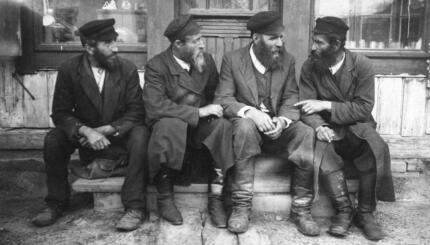Yesterday, the ISJL hosted students from Operation Understanding, an organization whose mission is to develop a group of young African American and Jewish leaders knowledgeable about each other’s histories and cultures to effectively lead the communities of Philadelphia, PA and Washington, D.C. to a greater understanding of diversity and acceptance.
Operation Understanding students at ISJL office
I thought I would share with our readers here a little of what I shared with the students in our office.
Having taught high school history for a number of years, I was thrilled to have the opportunity to do a presentation for teenagers on the relationship between Southern Jews and African Americans. This is not an easy talk to give to any age group, because while we like the stories of Jews fighting for civil rights, the historical truth is that those were primarily Northern Jews; most Southern Jews were not actively involved in fighting against the white hierarchy of the South.
Jews in states like Mississippi lived in a climate of fear and intimidation. Southern Jews were acutely aware that any challenge to white supremacy would result in serious social and economic consequences. Synagogue bombings, threats of economic boycott, and violence directed against civil rights workers convinced a lot of Southern Jews to remain relatively silent.
African American activists faced the same challenges, but to a much higher degree. James Chaney – one of three civil rights workers murdered during Freedom Summer by members of the Ku Klux Klan near Philadelphia, Mississippi – struggled to find support for civil rights among his local community. They were afraid of falling prey to what ultimately happened to Chaney. Chaney knew the risk and accepted it, paying dearly for his bravery. Following his death, his mother Fannie made sure that James’ younger brother Ben would follow his brother’s footsteps. I can’t imagine the kind of courage that would allow a mother to risk such a sacrifice, but she did, and Ben is still an active advocate of civil rights today.
Rabbi Arthur Lelyveld, a Jewish activist who came down to Hattiesburg, Mississippi trying to register black voters, elected to leave the danger almost as soon as he arrived. He did not make the decision lightly or at some small act of intimidation, however: he was senselessly beaten with a tire iron in board daylight by white supremacists. A small group representing Hattiesburg’s Jewish community urged him to get out of town, fearful their synagogue would get burned or their members injured or killed. Lelyveld responded: “Don’t worry, I can’t wait to leave.”
These stories illustrate of a larger lesson: when any one of us fights for a social justice cause, we often embark on that journey with the best of intentions and without anticipating all of the dangers, difficulties and tragedies along the way. When that path threatens our safety or the safety of others, we begin to question how far we should go. Despite enduring great risk and suffering great injury, Lelyveld was able to return to the North and never face his aggressors again. Jews within the Hattiesburg community had to live among them with the memory of his beating urging them against anything other than compliance.
Asking and answering questions
Even still, some very brave Southern Jews did stand up for civil rights in all sorts of ways. Many prominent Southern rabbis called for an end to bombings of African American churches and school segregation. And, despite the threat of boycotts against businesses owned by their husbands and families, many Jewish women worked against the segregationist system through organizations like the Women’s Emergency Committee. The organization was formed to combat the governor’s closing of Little Rock High schools. One Jewish woman, Marilyn Siegel, raised money for the WEC while dying from cancer.
Today, learning and working together, we can use these stories as an opportunity to ask ourselves larger questions about what we would do in similar circumstances. The issue of personal sacrifice for the sake of the common good is at the crux of a democracy. Each of us must inevitably weigh just how much we are willing to sacrifice for others every day in our own lives.
Here are some of the reflections and insights from some of these amazing students:
- “I think too many people my age assume someone else is going to take care of things and so they don’t do anything but it doesn’t mean we don’t still care.”
- “In my community, the biggest problem is young black males being incarcerated, but I don’t know how to help because the problem seems so big.”
- “A bunch of us walked out to protest budget cuts to our public schools, but not everyone because they were scared of being suspended. I think we let fear get in the way of standing up for things we care about.”
- “I like the fact that my community is so diverse. I think it makes everyone stronger somehow. People tend to look out for one another and that makes me proud to live there.”
What are your observations about diversity in your community? How do historical narratives shape your own understanding? I’d love to hear your thoughts, too.
Like this post? Join the conversation through MyJewishLearning’s weekly blogs newsletter.



